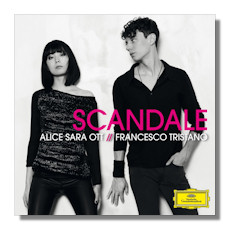
The Internet's Premier Classical Music Source
Related Links
-
Ravel Reviews
Rimsky-Korsakoff Reviews
Stravinsky Reviews - Latest Reviews
- More Reviews
-
By Composer
-
Collections
DVD & Blu-ray
Books
Concert Reviews
Articles/Interviews
Software
Audio
Search Amazon
Recommended Links
Site News
 CD Review
CD Review
"Scandale"

- Francesco Tristano: A Soft Shell Groove
- Igor Stravinsky: Le Sacre du printemps
- Nikolai Rimsky-Korsakoff: The Story of the Kalendar Prince from "Schéhérazade"
- Maurice Ravel: La Valse
Alice Sara Ott & Francesco Tristano, piano
Deutsche Grammophon 4793541 DDD TT 61:56
The "Scandale" popping up in pink font on the cover of this CD refers to the 1913 premiere of Igor Stravinsky's ballet The Rite of Spring in Paris, performed here in the composer's version for piano duet. Never mind that the scandal – adroitly masterminded by impresario Sergei Diaghilev – had in fact more to do with Vaslav Nijinsky's unconventional choreography than with Stravinsky's music – the score survived unscathed, yet Nijinsky's choreography was never seen again, until its resurrection in 1987 for the Joffrey Ballet. Pianists Alice Sara Ott and Francesco Tristano team up in what primarily looks like an homage to the visionary genius of Diaghilev and an extraordinary group of creative artists, who caused a hundred years ago with the Ballets Russes a shockwave in the arts world – one that clearly still ripples on.
However, as we are informed by the liner notes and press release of "Scandale", there is more. In a remarkable attempt to unravel similarities between the Diaghilev-era scores and contemporary dance music, in particular techno, the playing of Ott and Tristano boasts remarkable clarity and emphasizes the rhythmic patterns and (in the case of The Rite of Spring) the repetitive themes of the music. In short, the piano is primarily seen as a percussive instrument, ideally suited to dance. Nothing really new of course, but hey, this convinces only partially. A lot is overlooked by this approach, not in the least the fact that these scores were used in connection with theatrical performances and are telling a story. One surely marvels at the colorful harmonies and inventive rhythmical riffs of the Russian and French composers in the first decades of the 20th century (and I dare you not to hear any similarities with techno), beautifully revealed by this piano duo, yet the narrative aspect, the drama, remains underplayed, most of all in The Rite where the closing pages depicting the gruesome sacrifice of the maiden sound merely prosaic. The lyrical movement from Rimsky-Korsakov's Schéhérazade (which was not composed for a ballet in the first place, but used later by Diaghilev in one of his early exotic Ballets Russes extravaganzas aimed at conquering the Parisian arts scene) seems to resist this approach altogether. Still, as with Ravel's La Valse (in the composer's version for piano duet) it benefits to a certain degree from the cool transparency, the well-judged dynamic control, and the perfectly calibrated playing of Ott and Tristano.
The presence of a composition from Luxemburg-born Tristano on a CD with music from the Ballets Russes era may at first sight look bizarre. Of course, it's there to make a point. A Soft Shell Groove for two pianos (receiving its world-premiere recording) is a catchy, rhythm-driven piece – including the trademark Tristano device of thumping the piano frame – which captures something of the dance-like energy of Stravinsky and Ravel, and is wonderfully played.
This is a brave disc, although one that still isn't as fully-fledged as it pretends to be. It's mainly a journey of discovery by two talented, wide-eyed young artists and not everything falls into place yet. Just enjoy the playing as it is, forget the words. Moreover, Ott and Tristano are touring the world with "Scandale" at the time of writing, appearing in concert-halls as well as clubs. Their skills and enthusiasm for everything they do are undeniable, and that may be the best thing about "Scandale" – who knows it may even bring new people to classical music.
Copyright © 2014, Marc Haegeman




















